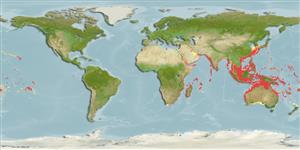>
Scombriformes (Mackerels) >
Scombridae (Mackerels, tunas, bonitos) > Scombrinae
Etymology: Euthynnus: Greek, eu = good + Greek, thynnos = tunna (Ref. 45335).
Environment: milieu / climate zone / depth range / distribution range
Sinh thái học
Biển; Ở đại duơng, biển (Ref. 51243); Mức độ sâu 0 - 200 m (Ref. 54439). Tropical; 18°C - 29°C (Ref. 168); 35°N - 38°S, 19°E - 137°W (Ref. 54439)
Indo-West Pacific: in warm waters including oceanic islands and archipelagos. A few stray specimens have been collected in the Eastern Central Pacific. Highly migratory.
Length at first maturity / Bộ gần gũi / Khối lượng (Trọng lượng) / Age
Maturity: Lm 42.3, range 40 - 65 cm
Max length : 100.0 cm FL con đực/không giới tính; (Ref. 168); common length : 60.0 cm FL con đực/không giới tính; (Ref. 168); Khối lượng cực đại được công bố: 14.0 kg (Ref. 30874); Tuổi cực đại được báo cáo: 6 các năm (Ref. 121508)
Các tia vây lưng cứng (tổng cộng) : 10 - 15; Các vây lưng mềm (tổng cộng) : 11 - 15; Tia cứng vây hậu môn: 0; Tia mềm vây hậu môn: 11 - 15; Động vật có xương sống: 39. This species is distinguished by the following characters: medium-sized fish with a robust, elongate and fusiform body; teeth small and conical, in a single series; total gill rakers on first gill arch 29-34; D1 XI-XIV with both dorsal fins separated by only a narrow interspace (not wider than eye), anterior spines of first fin much higher than those midway, giving fin a strongly concave outline; D2 much lower than first and followed by 8-10 finlets; anal fin followed by 6-8 finlets; pectoral fins short, never reaching interspace between dorsal fins; 2 flaps (interpelvic process) between pelvic fins; very slender caudal peduncle with a prominent lateral keel between 2 small keels at base of caudal fin; body naked except for corselet and lateral line. Colour of back dark blue with a complicated striped pattern which does not extend forward beyond middle of first dorsal fin; lower sides and belly silvery white; several characteristic dark spots between pelvic and pectoral fins (but may not always be present) (Ref. 9684, 90102).
Occurs in open waters but always remains close to the shoreline. The young may enter bays and harbors. Forms multi-species schools by size with other scombrid species comprising from 100 to over 5,000 individuals. A highly opportunistic predator feeding indiscriminately on small fishes, especially on clupeoids and atherinids; also on squids, crustaceans and zooplankton. Caught in multispecies fisheries, mainly by surface trolling; also with gill nets. Generally marketed canned and frozen; also utilized dried, salted, smoked and fresh (Ref. 9684).
Collette, B.B. and C.E. Nauen, 1983. FAO Species Catalogue. Vol. 2. Scombrids of the world. An annotated and illustrated catalogue of tunas, mackerels, bonitos and related species known to date. Rome: FAO. FAO Fish. Synop. 125(2):137 p. (Ref. 168)
IUCN Red List Status (Ref. 130435)
Threat to humans
Reports of ciguatera poisoning (Ref. 30911)
Human uses
Các nghề cá: tính thương mại cao; cá để chơi: đúng
Các công cụ
Special reports
Download XML
Các nguồn internet
Estimates based on models
Preferred temperature (Ref.
123201): 20.7 - 28.5, mean 26.9 °C (based on 1384 cells).
Phylogenetic diversity index (Ref.
82804): PD
50 = 0.6250 [Uniqueness, from 0.5 = low to 2.0 = high].
Bayesian length-weight: a=0.01000 (0.00862 - 0.01160), b=3.05 (3.01 - 3.09), in cm total length, based on LWR estimates for this species (Ref.
93245).
Mức dinh dưỡng (Ref.
69278): 4.5 ±0.0 se; based on diet studies.
Generation time: 1.6 (1.2 - 2.5) years. Estimated as median ln(3)/K based on 11
growth studies.
Thích nghi nhanh (Ref.
120179): Trung bình, thời gian nhân đôi của chủng quần tối thiểu là 1.4 - 4.4 năm (K=0.4-0.5; tm=3; Fec=210,000).
Prior r = 0.88, 95% CL = 0.58 - 1.32, Based on 5 full stock assessments.
Fishing Vulnerability (Ref.
59153): Moderate vulnerability (36 of 100).
Climate Vulnerability (Ref.
125649): High to very high vulnerability (75 of 100).
Nutrients (Ref.
124155): Calcium = 20.9 [9.6, 171.3] mg/100g; Iron = 2.28 [0.88, 5.97] mg/100g; Protein = 23.1 [21.1, 24.7] %; Omega3 = 0.235 [0.129, 0.428] g/100g; Selenium = 70.6 [35.4, 143.5] μg/100g; VitaminA = 20.2 [5.4, 77.8] μg/100g; Zinc = 0.408 [0.211, 1.643] mg/100g (wet weight); based on
nutrient studies.
